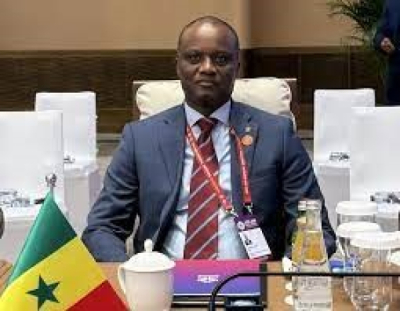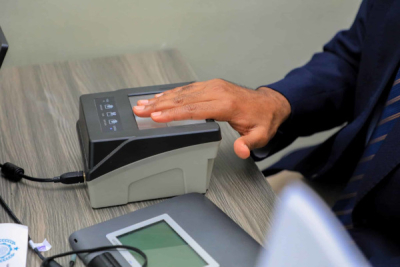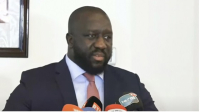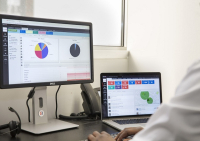He has made the digitization of supply chains his main area of innovation, offering concrete solutions to rethink industry practices. He combines technology and efficiency to improve supplier relationships.
South African entrepreneur Clive Govender specializes in management consulting, supply chain, and digital transformation. He is the founder and CEO of Adapt Digital Solutions, a technology firm based in South Africa.
Founded in 2020, Adapt Digital Solutions develops digital solutions to help companies improve supplier diversity, reduce supplier-related risks, and optimize operational costs within their supply chains.
A key achievement for the company is the Mining Enterprise and Supplier Development (ESD) Platform, developed in collaboration with Accenture. Launched in 2022, this cloud-based platform supports South Africa’s mining industry by managing the complete lifecycle of local supplier development. Its features include company registration, verification, technical and financial support, and transparent publication of sourcing opportunities.
In addition to his work at Adapt Digital Solutions, Govender is also the founder and managing director of CGC Consulting, a firm he established in 2016. CGC Consulting focuses on transforming procurement processes and structures to help clients improve logistical efficiency. The company offers comprehensive procurement and supply chain management solutions aimed at generating tangible value for businesses.
Govender holds a bachelor's degree in economics and business management from the University of South Africa, a bachelor's in operations management from the University of Hertfordshire in England, and a master's degree in business strategy from Henley Business School.
His professional career began in 1995 as a quality manager at ABB, a role he held until 1997. He returned to the company in 2000 as a business process general manager before being promoted to vice president of supply chain management and sustainable development in 2001. Between 2006 and 2016, he served as head of procurement and supply chain for Anglo American Platinum, a global mining company with operations in South Africa.
Melchior Koba
As digitalization takes hold in Africa, it's simplifying daily life in a variety of sectors. The Ghanaian entrepreneur is now using this shift to develop a digital platform for the wellness industry, aiming to make beauty services more widely available.
Ghanaian entrepreneur Nunya Tomey is bringing the beauty and wellness industry online with his digital platform, TWiST Beauty.
Launched in 2023, TWiST Beauty is a mobile application designed to connect clients with beauty professionals. It allows users to search for and book appointments for a range of services, including hairstyling, makeup, and skincare. The platform offers the flexibility of in-salon or at-home appointments, based on user preference.
For professionals, the app features a central dashboard to manage schedules, track performance, and run promotional offers. It also includes a loyalty program, TWiST Coins, to reward regular clients.
Tomey, who serves as the company's founder and CEO, also launched a separate service in 2024 called KOJE Delivery. This platform facilitates low-cost package shipping through a collaborative model where travelers can earn money by delivering parcels.
Tomey's career began in 2017 as a graphic designer for Reach for Change, a nonprofit organization supporting social entrepreneurs. He holds a bachelor's degree in computer science from the University of Ghana, earned in 2020, and a master's in entrepreneurship from MEST Africa, completed in 2024. He previously worked as a product designer for Webbermill, an application publisher, from 2020 to 2022, and as the head of marketing and sales for Detosphere, a technology firm, in 2023.
Melchior Koba
Africa’s Urban Population Is Growing Rapidly, Straining Infrastructure and Services. Smart cities are emerging as an innovative solution to better manage energy, mobility, and the environment, while promoting inclusion.
Smart cities are emerging as a strategic solution to manage Africa's rapid urbanization, a demographic shift putting immense pressure on the continent's infrastructure and public services.
According to the United Nations, nearly 60% of Africa’s population will live in urban areas by 2050, up from about 43% today. This accelerated population growth is profoundly transforming urban landscapes and straining mobility, resource management, and public services. In response, a number of nations are embracing the smart city concept.

These projects integrate advanced technologies like the Internet of Things, artificial intelligence, data platforms, and Geographic Information Systems. The goal is to optimize public services, improve mobility, monitor the environment, and promote social inclusion. Ultimately, a smart city aims to combine technological innovation, sustainable development, and citizen participation to create a more efficient, attractive, and resilient living environment.
Concrete Projects Emerge Across the Continent
Several African nations are advancing with smart city initiatives. Kenya is developing Konza Technopolis, a hub that integrates businesses, universities, and innovation centers. In Senegal, the city of Diamniadio aims to decongest the capital of Dakar by creating a modern city with administrative, industrial, and residential zones. Morocco is focusing on the intelligent management of water networks, public lighting, and traffic in several cities. Meanwhile, an ambitious project in Tunisia plans for the continent's first smart automotive city, a hub that could generate up to 100,000 jobs by combining industrial production, technological innovation, and sustainable urban planning.
These initiatives are part of a global market poised for rapid growth. Fortune Business Insights estimates that the global smart cities market, valued at $623.9 billion in 2023, is projected to reach $4.65 trillion by 2032, with a compound annual growth rate of 25.2%. While North America currently leads the market with a 40.87% share, Africa has immense potential to catch up due to its favorable demographics and the significant room for improvement in its infrastructure.
Challenges and Outlook
Despite the potential, the implementation of smart cities in Africa faces significant hurdles. The high costs of design, construction, and maintenance are a major challenge, compounded by a scarcity of suitable financing. Regulatory frameworks, particularly for data protection and cybersecurity, are often insufficient. Furthermore, a shortage of skilled labor limits countries' ability to design and manage these complex systems. Social acceptance is also a key factor, as citizen engagement is essential for a project's success. Finally, Africa must ensure that these technologies do not widen the digital divide, benefiting only affluent neighborhoods at the expense of disadvantaged areas.
If these obstacles can be overcome, the benefits for the continent could be substantial. Smart cities could lead to accelerated infrastructure modernization, optimized urban management, reduced operational costs for local authorities, large-scale creation of skilled jobs, and a notable improvement in quality of life. These cities have the potential to become regional engines of competitiveness while contributing to the Sustainable Development Goals, providing Africa with a crucial lever for its urban and economic future.
Samira Njoya
As a trained accountant, he chose to address Uganda's unique financial challenges by integrating digital solutions into often-overlooked sectors.
Joseph Lukula, a Ugandan entrepreneur and financial inclusion advocate, is leveraging his background in accounting to address the country's unique financial challenges. He is the co-founder and CEO of Nexen Tech, a company that develops advanced technological solutions for the financial sector.
Launched in 2022, Nexen Tech offers a cloud-based platform that automates core banking operations. The solution uses artificial intelligence to analyze data and flag operational efficiencies and inefficiencies. The platform simplifies the management of savings and credit cooperatives by streamlining member, loan, deposit, and transaction management while ensuring regulatory compliance and strengthening their ability to serve underbanked populations.
Lukula is also the co-founder and CEO of Nexen Micro Credit, a microfinance institution he established in 2016. Through its digital platform, the institution provides working loans to hundreds of low-income small businesses, primarily in Uganda.
Lukula earned a bachelor's degree in business management and administration from Uganda Martyrs University in 2011 and a master's in accounting and finance from Coventry University in England in 2014. His career began in 2012 as a banking officer at GTBank. In 2015, he joined Premier Credit, a Kenyan microfinance company, as an accountant. Premier Credit provides financial solutions to businesses, government entities, and individual entrepreneurs.
Melchior Koba
Despite his training in accounting, he chose to build a career in the music and film industries. He now leverages digital tools to bring African film productions to a global audience.
Modou Lolly Sarr, a Senegalese sound technician, entrepreneur, and self-taught developer, is the founder and CEO of Wawaw, a new digital platform designed to promote local cinema.
Launched in 2024, Wawaw has emerged as a key player in the African film industry. The platform offers a wide range of African and international streaming content, making cinema more accessible to local audiences by providing features such as subtitles and dubbing in local languages, including Wolof.
Beyond its streaming services, Wawaw provides professional tools for filmmakers, offering solutions to help manage film production, booking, and modernization processes. This approach is intended to help the industry overcome key challenges.
“Our mission is to create an integrated platform for streaming, booking, and film project management, aimed at promoting local cinema, facilitating access to film resources, and modernizing production processes,” Sarr said in a statement.
Sarr is also the managing director and a sound engineer at WordSharp Music, a music production studio he founded in 2014. Before launching Wawaw, he co-founded Cyan Senegal, a marketing and communications agency, in 2019.
Melchior Koba
Digitizing civil registration systems empowers citizens with legal identity, improves access to rights and services, enables inclusive planning, and unlocks measurable economic and social gains.
Somalia has taken a major step forward in its digital transformation journey with the rollout of a Unified Digital Civil Registration Service in 19 districts across the country. The announcement was made by the Ministry of Interior, Federal Affairs and Reconciliation during the commemoration of the 8th Africa Civil Registration and Vital Statistics (CRVS) Day on August 10. The initiative aligns with the annual AU-backed commemoration established in 2018 to highlight the importance of robust CRVS systems and rally support for ensuring every citizen is officially recorded.
The new platform enables local administrations in Federal Member States—including Jubbaland, South West, Hirshabelle, Galmudug, and Northeastern State—to digitally register births, marriages, divorces, and deaths. All records are stored in a centralized national database, ensuring that citizens’ legal identities are secure, accessible, and tamper-proof.
Officials say the system will significantly reduce administrative bottlenecks, cut costs associated with paper-based records, and improve the speed and accuracy of service delivery. The Ministry is already working to integrate the platform with other government services such as health, education, national ID, and immigration—laying the groundwork for a fully interconnected e-government ecosystem.
According to UNICEF, as part of the digital CRVS pilot, 19 districts were equipped with modern registration tools, including tablets for health facilities without computers. The Federal Ministry of Education has also committed to mainstreaming CRVS into the school enrolment process—starting with primary-age children who have missed out on registration—ensuring that digital identity begins at the earliest stages of life.
Reliable civil registration is the backbone of effective governance and inclusive digital transformation. According to the 2020 Somalia Demographic and Health Survey, only 3% of children under five have had their births officially registered, and a mere 0.3% hold a birth certificate, one of the lowest rates globally. This leaves millions without legal identity, limiting access to education, healthcare, voting rights, and social protection programs.
By expanding access to official documentation, the digital registry is expected to boost citizen participation in public life, facilitate access to social services, and strengthen national planning through reliable population data. Plans are in place to scale the service to every district, including remote and underserved areas.
The move aligns with the African Union’s push for legal identity as the cornerstone of digital governance, and comes as Somalia seeks to modernize public administration, enhance transparency, and close the gap in civil registration coverage.
Hikmatu Bilali
His career, which blends technical expertise with an entrepreneurial mindset, is a prime example of Africa's emerging tech sector. This industry is proving its ability to innovate in key areas like customer service, digital services, and automation, all while creating significant value for the continent's development.
Mohamed Elmasry is an Egyptian engineer and entrepreneur who co-founded and serves as CEO of Tactful, a technology company specializing in customer experience optimization. Founded in 2016 by Mohamed Elmasry, Mohammed Hassan, and Sherif Khairallah, Tactful is headquartered in the United Kingdom with development centers in Cairo and Cambridge. The company's solution enhances customer service by integrating all digital and voice channels into a single tool.
Tactful's platform allows businesses to track customer interactions in real time via a unified dashboard that combines social media, live chat, email, and telephony. Advanced technologies, including no-code automation, an AI-based intelligent routing engine, and multilingual chatbots, enable companies to efficiently handle repetitive requests. This boosts team productivity while optimizing customer satisfaction.
Before Tactful, Elmasry had several entrepreneurial ventures. In 2003, he founded Luxor Instruments, an Egyptian company that developed internet solutions, and served as its technical director for three years. He co-founded Silicon Vision, an intellectual property company for radio frequency technologies, in 2012, where he was head of design until 2014. The following year, he founded Boost Valley Consulting Services, a digital design and verification company, where he led engineering until 2016.
Elmasry holds a bachelor’s degree in electrical, electronic, and communications engineering from Minia University in Egypt, and a diploma in management and business administration from Cambridge Judge Business School. In 2004, he was hired by Telecom Egypt as a network design engineer. He joined the research and development company ComSpots in 2006 as a founding employee and head of design. From 2022 to 2024, he was a partner at Dstny Group, a European provider of business communications solutions.
Melchior Koba
-
Senegal and BOAD discussed using the Digital Transformation Fund to modernize public services.
-
Fund would back projects under Senegal’s $1.7 billion Technological New Deal.
-
Plan faces a 155 billion CFA franc funding gap.
Senegal’s Minister of Communication, Telecommunications, and the Digital Economy, Alioune Sall, met with a delegation from the West African Development Bank (BOAD) on Thursday, August 7. The meeting focused on strengthening Senegal's digital sovereignty and improving the efficiency of public services through a new partnership.
Discussions centered on the Digital Transformation Fund (FTD), an innovative financing mechanism backed by BOAD and the German bank KfW. The fund aims to support high-impact digital projects that can modernize the country's information systems and public services.
The two parties identified potential synergies between the FTD’s financing and the priority projects outlined in Senegal's national digital strategy, the Technological New Deal. BOAD reaffirmed its commitment to supporting Senegal's digital transformation and strengthening its administration through strategic partnerships.
If the collaboration moves forward, BOAD could finance critical infrastructure and public service digitization projects, helping to create a more dynamic digital ecosystem. This support would allow Senegal to accelerate its Technological New Deal objectives, while also boosting its digital sovereignty and economic competitiveness.
The Technological New Deal has an overall budget of 1,105 billion CFA francs ($1.7 billion). Of that amount, 950 billion CFA francs have been identified, including 150 billion from private financing and 800 billion from the "Vision 2050" transformation agenda. This leaves a shortfall of 155 billion CFA francs to be mobilized to fully achieve the plan's objectives.
Samira Njoya
Her vision for connected health, which combines technology and care, aims to solve Africa's healthcare access challenges. Her background makes her a key figure in the transformation of the continent's healthcare sector.
Zanele Abraham Matome, a South African entrepreneur, is the CEO of Welo Health, a health technology startup founded in 2020. The company aims to improve healthcare access by combining digital innovation with a human approach.
Welo Health provides a digital platform that connects companies, health insurers, and individuals with qualified medical professionals. These professionals, including doctors, nurses, and specialists, offer in-home or remote consultations. The startup also implements workplace wellness programs to combat absenteeism and boost productivity.
The company's services include preventive medicine, medication delivery, rapid interventions, telemedicine, occupational health management, health risk assessments, and personalized support.
"Our dynamic platform connects corporate clients with top-tier healthcare professionals, ensuring immediate access to quality care," Matome explained. "In the simplest terms, Welo is a subscription-based B2B service. We collaborate with corporates and healthcare providers to offer health services to employees, paid for by the employers."
Matome also serves as an entrepreneurship ambassador for The StartUp Tribe, an initiative launched in 2020 to help 10 million young people begin their entrepreneurial journeys. In 2023, her company was featured in the Africa Health Tech 50 ranking, which highlights the most promising healthcare startups in sub-Saharan Africa.
Melchior Koba
• Mauritania launched a platform to digitalize mining permit oversight and boost transparency.
• Users can securely submit production, expense, and CSR data.
• The move modernizes a sector making up 23% of GDP amid weak e-governance.
Mauritania’s Ministry of Mines and Industry has launched a new digital platform to monitor and oversee mining and quarrying permits. The initiative is designed to increase transparency, ensure data reliability, and simplify administrative procedures for granting and supervising licenses.
The platform requires a secure login and allows permit holders to submit technical and production data, expense documents, and updates on their corporate social responsibility. Users can also file various administrative requests, such as sample submissions and approval applications.
The confidentiality of all data is protected under Article 59 of the mining law, which covers activity declarations, environmental, administrative, and financial monitoring, and the transfer of mandatory information. The ministry has instructed license holders to contact its regional offices or email Cette adresse e-mail est protégée contre les robots spammeurs. Vous devez activer le JavaScript pour la visualiser. to get their login credentials and a user guide.
This platform arrives as Mauritania's e-governance is still developing. The country ranks 174th out of 193 in the United Nations Global E-Government Development Index with a score of 0.3491. This low ranking highlights a significant gap in digital infrastructure, access to online public services, and the use of technology within the government.
The digitalization of mining oversight is a key step for a sector that contributes about 23% to Mauritania's national GDP. It could improve transparency among stakeholders and make the country more attractive to investors. By centralizing data and streamlining communication between the government and operators, the platform provides a strategic tool for a more rigorous and modern regulation of Mauritania’s extractive activities.
Samira Njoya
More...
The entrepreneur is developing projects that combine savings, payments, and distribution to revolutionize common financial practices for people in Africa.
Oussoumanou Sehou, a Cameroon-based entrepreneur, specializes in fintech and Know Your Customer (KYC) analysis. He is the founder and CEO of Molo Molo Pay, a company launched in 2022 that offers installment payments for everyday consumer goods.
Molo Molo Pay's mobile application allows users to reserve products like phones, motorcycles, and household appliances. Users can pay for these items in installments, making essential goods more accessible for people with limited financial resources. This approach is part of a broader financial inclusion strategy.
The application also features a savings tool, which helps users manage their payments gradually. A user selects a product, makes regular payments, and tracks their progress on the interface. Once the full amount is paid, they can pick up the item from a partner store. This model targets African markets where traditional credit systems are often difficult to access.
Sehou is also the founder of Nanou, a fintech platform launched in June 2025. Nanou allows users to receive items on credit and pay in installments. Additionally, he works as a KYC officer at Mastercard and is an associate at BlackRock, a U.S.-based asset manager and technology provider.
Sehou earned an advanced management degree in 2017 from the Pan-African Institute for Development in West Africa, located in Cameroon. He also holds a master’s degree in banking, business, finance, and securities law from HEC Paris, which he obtained in 2020.
His professional career began in 2018 as a data quality analyst at HSBC, a London-based banking and financial services group. From 2020 to 2023, he was a credit agent at FairMoney, a Nigerian startup specializing in instant loans.
Melchior Koba
• BCEAO to launch instant payment system (PI-SPI) for WAEMU in September.
• Enables real-time transfers across banks, microfinance, and mobile money.
• Supports rising digital use; e-money accounts hit 209M in 2023.
The Central Bank of West African States (BCEAO) announced on Friday that its Interoperable Instant Payment System Platform (PI-SPI) is scheduled to launch at the end of September. The new regional infrastructure is designed to facilitate real-time money transfers within the WAEMU area.
The system will allow clients of banks, microfinance institutions, and electronic money operators to make instant, secure, and interoperable transfers regardless of the account type or channel used. Pilot tests have been underway with a sample of selected clients since June 5 to assess the system's performance under real conditions.
This unified payment system was established to meet the growing demand for faster, safer, and more accessible financial services in West Africa. According to a BCEAO report, the number of active electronic money accounts in the WAEMU area rose from 157 million to 209 million between 2022 and 2023, an increase of 32.74%. These services now contribute to 56% of the region’s overall financial inclusion rate, which was 72.3% at the end of 2023.
With PI-SPI, the central bank is advancing its payment system modernization plan and facilitating the interconnection of various financial players in the region. The goal is to build a more integrated ecosystem that can support the growth of fintechs, streamline electronic flows, and reduce the region's dependence on cash.
Ultimately, the system could encourage wider adoption of digital payment methods for daily use and expand access to financial services in areas underserved by traditional networks. By connecting financial sector players, this initiative paves the way for unprecedented regional interconnection.
Samira Njoya
• Flat6Labs becomes F6 Group, combining accelerator and new VC arm F6 Ventures.
• F6 Ventures manages $90M, aims for $200M and 200+ investments in 5 years.
• Responds to early-stage funding drop in MENA, down to $1.9B in 2024.
After more than a decade of supporting startups across the Middle East and Africa, Flat6Labs announced on Tuesday, August 5, that it is reorganizing into a new structure called F6 Group. The new entity will combine its flagship accelerator, Flat6Labs, with F6 Ventures, a new venture capital firm focused on seed-stage investments. This reorganization aims to provide more targeted support to early-stage ventures in emerging markets.
"F6 Ventures marks a new era in our journey, bringing focused capital and sharper execution to support the region’s boldest founders," said Dina el-Shenoufy, co-founder and General Partner at F6 Ventures. "We are extending our commitment to early-stage startups to help them scale from idea to impact."
According to a press release, F6 Ventures specializes in seed funding and currently manages over $90 million in assets with a portfolio of more than 300 startups. Flat6Labs will continue to operate as a leading acceleration platform. The F6 Group plans to launch several regional funds to grow its assets under management to $200 million and invest in more than 200 companies over the next five years.
This initiative comes as entrepreneurial ecosystems in Africa and the Arab world face a significant lack of early-stage funding. In the Middle East and North Africa, venture capital financing has slowed significantly over the past two years due to high interest rates. Fundraising in the region peaked at $3.6 billion in 2022 before dropping to $1.9 billion in 2024, reflecting the impact of global monetary policies on capital availability.
By combining capital and support under one umbrella, F6 Group aims to close this funding gap. The goal is to build a platform that can catalyze innovation through integrated support from pre-seed to regional expansion. This initiative could help emerging ecosystems by nurturing competitive tech companies, creating skilled jobs, and strengthening digital sovereignty in the regions.
Samira Njoya
As e-commerce booms in Africa, so do delivery services. In Egypt, one tech entrepreneur is tapping into this market by partnering with local businesses.
Founded in 2017 by El Sayed Kassem, Akelni is a Cairo-based startup that developed a digital solution to connect customers with local restaurants, cafes, and fast-food outlets. Its goal is to provide a fast, seamless meal ordering experience while helping partner restaurants with their digitalization.
Akelni's app, which has over 500,000 downloads on the Play Store, allows users to browse menus, place orders, customize meals, and track deliveries in real time. It offers a wide selection of dining options, from fast food to fine dining, including local brands. The service currently operates in several major Egyptian cities and plans to expand into other North African markets.
The company uses custom-developed technology with an intuitive customer interface, a dashboard for restaurant owners, and an integrated logistics solution for delivery staff. This model optimizes the restaurant value chain by reducing delivery times, improving order management, and facilitating digital payments.
With the demand for delivery services increasing, Akelni has positioned itself as a local competitor to international companies. The startup aims to strengthen its presence in the regional foodtech market by promoting a delivery model focused on proximity, efficiency, and digital inclusion.
Adoni Conrad Quenum















